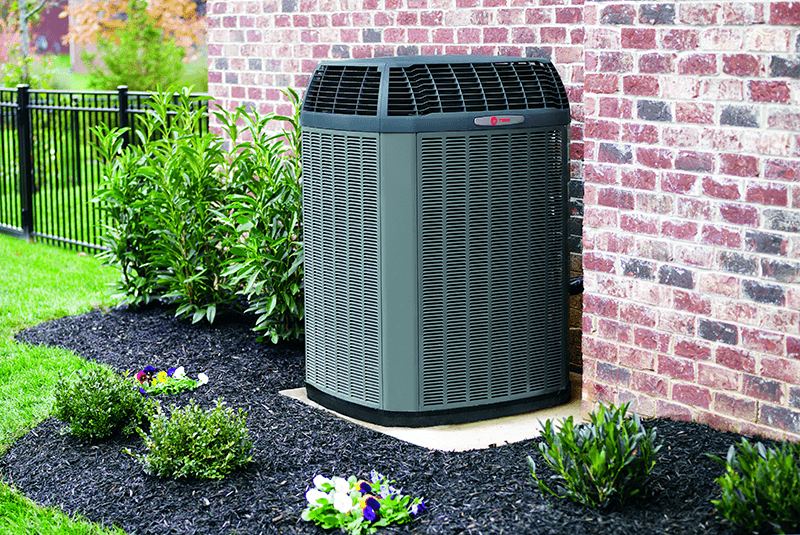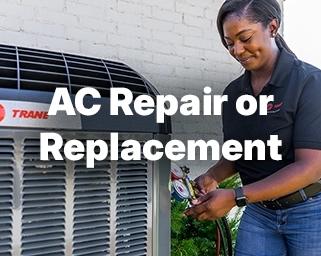AC Capacitors: A Small Part with a Big Job
Learn about air conditioner capacitors and why they’re such a vital part of your system.
Among the jumbled mass of wires inside your outdoor air conditioning unit lives one of the most important components of your entire HVAC system: your air conditioner capacitor.
What is a capacitor?
Your AC capacitor resembles a shiny, cylinder-shaped battery and is responsible for energizing your AC system’s motors to get them running when it’s time to cool things off in your home. It’s crucial to help the AC unit start and run. If you have a heat pump that heats and cools your home, you should know that it has an HVAC capacitor as well.
Since the capacitor works so hard, it’s easy to understand why AC capacitor replacement is one of the most common AC repair jobs. Keep reading for a breakdown of what you should know about the AC capacitor, including how to spot early signs of trouble, AC troubleshooting tips, and what you can do if yours goes on the fritz.
But first, a quick warning: air conditioning capacitors are dangerous, high-voltage devices. Touching or mishandling one could lead to serious injury or death. So, don’t handle them. Always consult an experienced and licensed HVAC technician if you’re experiencing problems with your air conditioner.

What does a capacitor do?
A capacitor for an AC unit provides the initial jolt of electricity your air conditioner’s compressor motor and fan motor need to run successfully. It stores electricity and sends it to your system’s motors in powerful bursts that get your unit revved up as it starts the cooling cycle. Once your AC is up and running, the capacitor reduces its energy output but still supplies a steady current of power until the cooling cycle finishes.
A/C capacitors are measured in voltage and microfarads. Voltage shows how much electrical current is moving through the capacitor. The more voltage in your capacitor, the faster the electrical current moves throughout it. Microfarads, meanwhile, describe how much electrical current the capacitor can store. Most capacitors range from 5 MFD (microfarads) to 80 MFD.
They may look and function similarly to batteries, but capacitors are not batteries. They’re connected to wiring inside your air conditioning system. That means you can’t simply open your unit up and pop a new capacitor inside if it’s time for a new one.
Don’t attempt to change your AC capacitor yourself because they’re high-voltage devices that could seriously harm you, even if the power is turned off. We’ll talk more about this later.
Why is a capacitor necessary?
Even though your AC unit is connected to your home’s electrical system, it needs a stronger boost to work effectively. That’s because air conditioners are high-powered machines that require a lot of energy to do what they’re built to do, and your home’s wiring simply doesn’t provide the adequate amount of power to get the job done.
The capacitor compensates by kickstarting your system’s motor and helping it cool your home until it takes a momentary break. Once it’s time for another cooling cycle, the capacitor gets back to work.
Capacitors have an important, strenuous job, which is why a failed capacitor is one of the most common reasons for a malfunctioning air conditioner, especially during the summer. A worn-out AC capacitor can cause widespread problems you’d probably rather avoid.
Contact a dealer
From finding the right HVAC system to maintaining it, a dealer is your best resource.
Get your questions answered every step of the way.
Start capacitor vs. run capacitor: What’s the difference?
Depending on how your HVAC system is built, there may be two single capacitors or one dual capacitor in your outdoor unit.
Systems requiring two single capacitors need a start capacitor and run capacitor to function properly. The start capacitor is designed to deliver the energy your AC’s compressor motor requires to start the cooling cycle. That’s it. Once your unit gets that initial jolt, the run capacitor steps in. It stores and then releases the energy needed to keep the motor going and your AC blowing.
If one of these capacitors fails, your HVAC technician may decide to replace both parts with a dual capacitor.
A dual-run capacitor is like getting a combo pack of candy bars. The device performs the same job as both the start capacitor and run capacitor. It gives your unit that important initial spark and supplies a consistent flow of electricity to keep it running. Dual capacitors offer a lot more convenience. They save space in your HVAC unit and can be easier for HVAC technicians to replace.

What are the signs of a bad capacitor?
Some telltale signs let you know when you should hire an HVAC technician to replace your AC capacitor. Some common symptoms of a bad capacitor include:
- Your AC takes time to begin a cooling cycle or just won’t start at all.
- Your AC randomly shuts off on its own.
- You can’t feel any cold air in your home while your AC’s running.
- Your AC is emitting a humming noise during operation.
- You notice smoke or detect a burning smell coming from your unit.
- Your energy bills are unreasonably high.
The causes of a bad AC capacitor vary but can include: debris hitting the capacitor and causing damage; extremely hot temperatures causing the capacitor to overheat; wear and tear over a long period; short circuits in the cooling system; power surges; and even lightning strikes.
How do you test an AC capacitor?
Call your local Trane dealer if you need help discerning whether your AC capacitor isn’t working the way it should and needs to be replaced. These trained professionals know how to check a capacitor using a special tool called a multimeter to measure the capacitor’s current, voltage, and resistance. You should not attempt doing any of this yourself as tinkering with your capacitor could result in serious injury or death.
You should hire an HVAC professional to help you.
How much does it cost to replace an AC capacitor?
If you’ve got confirmation from a licensed HVAC professional that your AC capacitor needs replacing, your AC capacitor replacement cost can range between $75-$250 for the part and installation, according to Forbes.
The price may vary depending on the HVAC capacitor brand, model, voltage, and the amount of labor required for installation. (Branded units are typically more expensive, costing up to $400 or more.) Your replacement costs can also vary based on whether you live in Miami or Minneapolis, whether you’re in Houston in the middle of a heat wave, and other factors.
If you’d rather buy the part yourself, your AC capacitor cost might be between $9 to $45, although certain brand-name parts and models could cost more. Labor and installation by a licensed HVAC professional may make up the bulk of your costs, and a dealer might not be motivated to install a part you’ve purchased yourself.
Can I replace my AC capacitor myself?
No, you can’t. Replacing an AC capacitor is not a DIY job. For safety reasons and the health of your unit, an experienced HVAC technician should replace your AC capacitor. The qualified technician has the experience to be able to correctly remove your defunct capacitor and replace it with a new one that will get your AC working as it should. DIY repairs can also void your warranty if you have one.Find a local Trane dealer in your area who can help you diagnose potential problems with your capacitor and replace it safely. If you don’t already, start scheduling regular air conditioner maintenance visits to keep your system running at peak performance.




